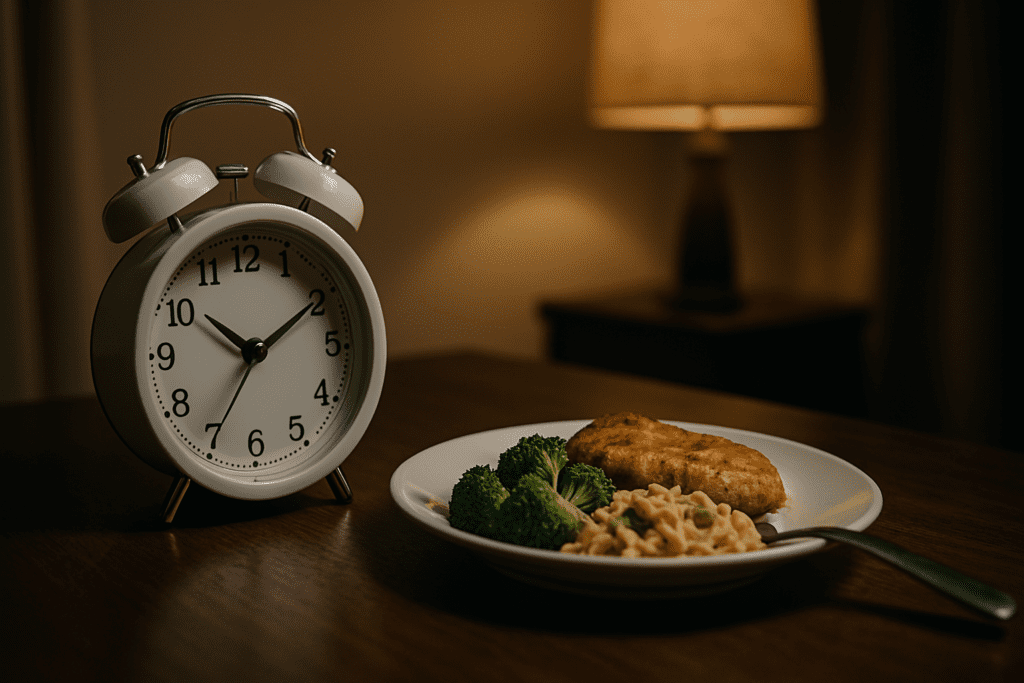The longstanding mantra that breakfast is the most important meal of the day has come under scrutiny in recent years. As intermittent fasting, time-restricted eating, and other unconventional dietary strategies have gained popularity, many people are now wondering, “Should I skip breakfast to lose weight?” While some swear by this approach, others argue that skipping breakfast might do more harm than good. The science behind the effects of breakfast timing, meal composition, and daily caloric distribution is nuanced and evolving. In this article, we’ll take a deeper look at what the latest research suggests about skipping breakfast and eating heavier meals later in the day, while also exploring whether this strategy truly aids in weight loss and how it fits within a healthy lifestyle.
You may also like: Smart Healthy Eating Tips for Busy Professionals: How to Stay Nourished When You’re Always on the Go
Rethinking the Traditional Approach to Breakfast
For decades, nutrition guidelines emphasized starting the day with a hearty breakfast, promoting it as a way to jumpstart metabolism and curb overeating later on. This traditional view was based on observational studies that often showed an association between regular breakfast consumption and lower body weight. However, correlation does not imply causation. These studies did not account for the broader lifestyle habits of breakfast eaters, who tend to be more health-conscious overall, exercising regularly and avoiding smoking. As scientific inquiry has become more refined, controlled trials and meta-analyses have begun to paint a more complex picture.
Research now suggests that the benefits of eating or skipping breakfast depend on the individual’s metabolic profile, eating patterns, and overall caloric balance. Some studies show that skipping breakfast may reduce total daily caloric intake, thereby supporting weight loss. Others reveal potential risks, such as increased insulin resistance or late-day cravings. The simple question—”does skipping breakfast help you lose weight?”—requires a deeper dive into personalized nutrition, lifestyle factors, and long-term sustainability.
How Skipping Breakfast Affects Metabolism and Appetite
One of the main arguments against skipping breakfast has been the belief that it negatively impacts metabolism. Early research suggested that a morning meal could increase energy expenditure and reduce hunger throughout the day. However, more recent evidence challenges this assumption. In reality, the impact of breakfast on metabolism appears to be modest at best. Studies have shown that skipping breakfast does not necessarily lead to a significant reduction in metabolic rate. What matters more is total energy consumption across the day and how the body adapts to fasting and feeding windows.
Appetite regulation is another critical factor to consider. Some individuals may experience increased hunger later in the day if they skip breakfast, potentially leading to larger portion sizes at lunch and dinner. This raises the question, “is skipping breakfast bad and eating heavier lunch and dinner instead?” For some, it might be, especially if late-day eating leads to excess calorie intake or poor food choices. However, others adapt well to skipping breakfast, especially when their heavier meals are nutrient-dense and portion-controlled. Individual responses vary widely, highlighting the importance of personalized dietary approaches.

The Role of Circadian Rhythms in Meal Timing
Emerging research in chrononutrition—the study of how meal timing aligns with the body’s internal clock—adds another layer to this discussion. Our circadian rhythms regulate various physiological functions, including hormone secretion, digestion, and glucose metabolism. These rhythms suggest that the body may process food more efficiently earlier in the day. This means that eating a larger meal at breakfast and lighter meals later could, in theory, optimize metabolic health.
Yet, the practicality of this for modern lifestyles is debatable. Many people prefer to eat dinner with family or are not hungry first thing in the morning. Intermittent fasting regimens, such as the 16:8 protocol, often involve skipping breakfast and consuming meals within an eight-hour window later in the day. For individuals practicing this method successfully, the question “does skipping breakfast help you lose weight?” often yields a positive answer. When executed thoughtfully and in sync with one’s lifestyle, meal timing strategies can work effectively without disrupting health or well-being.
Intermittent Fasting and Time-Restricted Eating
Intermittent fasting (IF) has gained significant traction as a weight management strategy. By alternating periods of fasting and eating, IF aims to reduce caloric intake and enhance metabolic flexibility. Skipping breakfast is often a part of this regimen. When combined with conscious eating during the feeding window, IF can promote fat loss, reduce inflammation, and improve insulin sensitivity. However, not all individuals respond equally.
Some research shows that men tend to benefit more from IF protocols that include breakfast skipping, while women may experience disruptions in hormonal balance or increased stress levels. This suggests that sex-specific responses should be taken into account. Furthermore, people with certain health conditions, such as diabetes or gastrointestinal disorders, may not tolerate long fasting periods well. Thus, before deciding, “should I skip breakfast to lose weight?” it’s essential to consult with a healthcare provider or registered dietitian, especially when managing underlying health issues.
Caloric Distribution and Its Impact on Weight Loss
Beyond the question of whether to eat breakfast lies the issue of caloric distribution. Several studies have compared the effects of consuming most daily calories at breakfast versus dinner. Some results indicate that front-loading calories earlier in the day can support weight loss and better glycemic control. These findings align with our natural circadian rhythms, where insulin sensitivity tends to be higher in the morning.
However, a different body of research suggests that total daily caloric intake remains the dominant factor in weight management. In other words, you can lose weight whether you eat heavier meals in the morning or evening, as long as your calorie intake remains lower than your expenditure. From this perspective, the phrase “is skipping breakfast bad and eating heavier lunch and dinner instead” becomes more of a matter of preference, routine, and overall energy balance than a clear-cut rule.
Psychological and Behavioral Considerations
The psychological aspect of eating cannot be overlooked. Food is not just fuel; it is closely tied to mood, stress, and social interaction. For some individuals, breakfast provides emotional comfort and structure, setting a positive tone for the day. Others may find that skipping breakfast helps them maintain better focus, particularly when they are not hungry in the morning. Cognitive performance and mood responses to breakfast omission vary, with some studies showing impaired memory or reduced alertness, while others report no significant difference.
Behavioral patterns, such as emotional eating or late-night snacking, may be more prevalent in individuals who skip breakfast if their hunger cues become dysregulated. This could lead to overeating later in the day, which undermines weight loss goals. Therefore, when evaluating “does skipping breakfast help you lose weight?” it’s important to assess not just physiological outcomes but also behavioral tendencies that might influence long-term adherence.
Cultural and Lifestyle Factors
Cultural norms and daily routines play a pivotal role in meal timing. In many Mediterranean and Latin cultures, lunch is the heaviest meal of the day, and dinner is lighter. In contrast, Western diets often emphasize a substantial dinner. Whether skipping breakfast fits into someone’s life often depends on job schedules, family obligations, and social habits. The growing popularity of remote work and flexible schedules may make time-restricted eating easier to implement for some.
Travel, shift work, and social events can also disrupt eating patterns. Consistency in meal timing has been associated with better metabolic outcomes, so frequent changes in routine may negate the potential benefits of any meal timing strategy. Hence, before deciding whether skipping breakfast is sustainable, it’s important to consider one’s daily structure and long-term feasibility.

Nutritional Quality of Meals Matters Most
Regardless of when meals are consumed, their nutritional quality remains paramount. Skipping breakfast only to indulge in high-calorie, low-nutrient meals later in the day does not support health or weight loss. Conversely, if heavier lunch and dinner meals are composed of whole foods—rich in fiber, lean protein, healthy fats, and complex carbohydrates—the body is more likely to respond favorably.
A balanced, nutrient-dense approach is crucial whether you start eating at 8 a.m. or 1 p.m. While it’s tempting to focus solely on the question, “should I skip breakfast to lose weight?” the broader focus should include what types of food you’re eating and how they contribute to your overall well-being. Quality and portion control often matter more than the specific timing of meals.
Understanding Individual Differences and Personalization
Perhaps the most critical takeaway from current nutrition science is that there is no one-size-fits-all approach. Genetic predispositions, metabolic rate, hormonal balance, gut microbiota, and lifestyle all influence how a person responds to breakfast skipping. Some thrive on intermittent fasting and reduced meal frequency, while others feel better eating three regular meals each day.
This is where the question “is skipping breakfast bad and eating heavier lunch and dinner” becomes inherently individual. Some may find that they are more productive, maintain a healthy weight, and feel mentally clear with this pattern. Others may experience increased fatigue, irritability, or weight gain. Self-monitoring, experimentation, and professional guidance can help determine what works best for you.
Practical Strategies for Success
For those considering breakfast skipping as a weight management tool, several strategies can enhance effectiveness and sustainability. Gradual adaptation is key—suddenly skipping breakfast after years of regular morning meals can lead to energy crashes and cravings. Instead, slowly push back your first meal by 30-minute intervals until you reach your desired eating window.
Hydration is also crucial. Many people mistake thirst for hunger, especially in the morning. Drinking water, herbal tea, or black coffee can help suppress appetite and maintain hydration during fasting hours. When it’s time to eat, focus on nutrient-dense meals that provide satiety and energy. Emphasize whole foods, and avoid breaking your fast with sugary or ultra-processed items.

Long-Term Sustainability and Health Outcomes
Ultimately, any diet or eating pattern must be sustainable to be effective. Short-term weight loss means little if the strategy cannot be maintained long term. Research shows that dietary adherence is one of the strongest predictors of success, regardless of the specific approach. Therefore, whether one skips breakfast or eats it daily should be based on personal preference, lifestyle compatibility, and nutritional adequacy.
Furthermore, health outcomes beyond weight loss must be considered. Blood pressure, cholesterol levels, blood sugar control, and mental well-being all factor into overall health. The decision to skip breakfast should support—not compromise—these broader wellness goals. A holistic perspective is essential for making choices that enhance long-term vitality.
Frequently Asked Questions: Skipping Breakfast and Strategic Meal Timing
Is it true that skipping breakfast can improve cognitive function for some individuals? Yes, emerging research indicates that some people may experience sharper focus and enhanced productivity in the morning when they skip breakfast. This is particularly evident in those who follow time-restricted eating or intermittent fasting patterns, where mental clarity is reported to increase during fasting windows. The brain may function more efficiently on ketones—an alternative fuel source that becomes more prominent during fasting states. While not universal, individuals who are not metabolically dependent on frequent glucose intake may benefit from this mental sharpness. That said, when asking “should I skip breakfast to lose weight,” it’s important to weigh cognitive advantages alongside other physiological and lifestyle factors.
How does skipping breakfast impact hormonal regulation, especially in women? Skipping breakfast may affect hormonal balance differently across genders. For women, extended fasting and breakfast omission have been associated with alterations in cortisol levels and potential menstrual irregularities in some cases. Estrogen and progesterone interact with insulin and cortisol, which are influenced by food intake timing. This means that although skipping breakfast might offer metabolic advantages for some, it may not be optimal for hormonal equilibrium in others. For women wondering, “does skipping breakfast help you lose weight,” it’s crucial to monitor not only weight changes but also menstrual health and stress response.
What are some long-term psychological effects of consistently skipping breakfast? While occasional fasting can be empowering, consistently skipping breakfast without mindful planning can sometimes contribute to disordered eating patterns or an unhealthy relationship with food. Individuals may begin to internalize restrictive rules or experience anxiety around eating outside their defined window. Social isolation can also occur, especially when breakfast is a communal or cultural norm. For those contemplating, “is skipping breakfast bad and eating heavier lunch and dinner instead,” it’s important to ensure that mealtime changes support mental and emotional wellness, not just physical health.
Can breakfast skipping influence gut health or digestive function? Yes, meal timing plays a role in gut motility and microbial health. The migrating motor complex (MMC), responsible for clearing out waste between meals, functions optimally during fasting periods. This means skipping breakfast could theoretically enhance gut cleansing if enough time elapses between meals. However, reduced meal frequency may also decrease the diversity of prebiotic-rich foods consumed throughout the day, potentially impacting microbiome diversity. Anyone exploring “should I skip breakfast to lose weight” should consider how their fasting schedule might affect both digestive rhythm and microbial resilience.
Does breakfast skipping influence physical performance or workout recovery? Exercising in a fasted state is a common practice for those aiming to burn fat, but it isn’t ideal for all athletes. Glycogen stores may be lower in the morning, and without a pre-workout meal, some individuals may feel fatigued or underpowered during high-intensity sessions. On the flip side, endurance athletes sometimes benefit from fasted cardio as a fat-adaptation technique. Whether or not “does skipping breakfast help you lose weight” aligns with your fitness goals depends on the type, timing, and intensity of your workouts, as well as recovery needs.
How does cultural background influence the perception and impact of skipping breakfast? Cultural eating patterns deeply influence when and what people eat. In some Asian and Mediterranean cultures, breakfast is minimal or optional, while in others, such as North America, breakfast is considered foundational. These cultural expectations affect not only social eating patterns but also the types of foods typically consumed. When deciding, “is skipping breakfast bad and eating heavier lunch and dinner,” one should factor in cultural norms and familial meal traditions, which can affect adherence and psychological comfort.
Is it possible to skip breakfast without triggering late-night cravings? Yes, but it requires strategic planning. People who skip breakfast often struggle with nighttime hunger if they don’t consume enough protein, fiber, or healthy fats during their later meals. A nutrient-dense lunch and dinner can improve satiety and curb cravings well into the evening. However, skipping breakfast without addressing macronutrient balance can lead to rebound snacking. So if you’re asking, “should I skip breakfast to lose weight,” the answer might be yes—but only if your other meals are well-structured and satisfying.
What role does sleep quality play in the decision to skip breakfast? Sleep and eating rhythms are tightly linked via circadian biology. Poor sleep can increase hunger hormones such as ghrelin while decreasing satiety signals like leptin. If someone has disrupted sleep patterns, they may wake up ravenous, making breakfast skipping more challenging and potentially unsustainable. Conversely, well-rested individuals often find it easier to maintain a morning fast. For those assessing “does skipping breakfast help you lose weight,” sleep quality is a critical but often overlooked variable that can influence appetite and dietary behavior.
Can adolescents or young adults safely skip breakfast for weight loss? Adolescents are in a rapid phase of growth and cognitive development, requiring steady nutrient intake throughout the day. While some teens may experiment with skipping breakfast for weight control, this approach is not generally recommended without professional guidance. Skipping meals during adolescence may lead to nutrient deficiencies, decreased academic performance, or unhealthy dieting behaviors. For parents or teens considering, “is skipping breakfast bad and eating heavier lunch and dinner,” it’s crucial to prioritize nutritional adequacy and stable energy levels during these formative years.
How can someone assess whether skipping breakfast is right for them long-term? Self-assessment tools like food journals, mood tracking, and body composition metrics can provide insight into whether breakfast omission is beneficial over time. It’s also helpful to consult a registered dietitian or health professional to evaluate metabolic markers such as fasting glucose, lipid panels, and cortisol levels. If energy levels are consistent, digestion is smooth, and weight goals are being met without negative side effects, breakfast skipping may be a sustainable strategy. However, if irritability, cravings, or fatigue increase, the approach should be revisited. Ultimately, answering the question “should I skip breakfast to lose weight” requires a blend of personal experimentation and evidence-based evaluation.
Reflecting on the Science of Skipping Breakfast and Strategic Meal Timing
The question “should I skip breakfast to lose weight?” cannot be answered with a simple yes or no. The science suggests that skipping breakfast may be a viable strategy for some individuals, particularly when it aligns with their lifestyle and is paired with nutritious, well-balanced meals later in the day. However, it is not a universal solution. Factors such as metabolic health, hormonal status, behavior patterns, and personal preferences all influence how someone responds to breakfast omission.
Similarly, the inquiry “is skipping breakfast bad and eating heavier lunch and dinner” depends on the nutritional quality of those meals and how they fit into the individual’s overall energy needs. While some research supports early caloric loading, other studies emphasize the primacy of total daily intake over meal timing. For those who find success with a delayed eating window, the answer to “does skipping breakfast help you lose weight?” might be a confident yes—but only if the strategy is thoughtfully implemented and sustainable.
At its core, effective weight management and wellness are about consistency, balance, and personalization. Rather than adhering to rigid dietary rules, it’s more beneficial to listen to your body, stay informed by credible scientific evidence, and make adjustments based on how you feel and function. In the end, breakfast is just one piece of the larger nutritional puzzle, and the best approach is the one that supports your health, lifestyle, and long-term goals.
intermittent fasting benefits, time-restricted eating, meal timing and metabolism, skipping meals and weight loss, circadian rhythm and eating, healthy eating habits, metabolic health strategies, mindful eating practices, nutritional timing for fat loss, appetite control techniques, hormone balance and diet, insulin sensitivity and meals, breakfast and metabolism myths, personalized weight loss plans, balanced diet for weight loss, nutrition science insights, sustainable dieting strategies, whole foods for energy, emotional eating awareness, weight management lifestyle
Further Reading:
Timing of Breakfast, Lunch, and Dinner. Effects on Obesity and Metabolic Risk
Is Skipping Breakfast Bad for You? The Surprising Truth
Eating breakfast won’t help you lose weight, but skipping it might not either
Disclaimer
The information contained in this article is provided for general informational purposes only and is not intended to serve as medical, legal, or professional advice. While NewsHealthWatch strives to present accurate, up-to-date, and reliable content, no warranty or guarantee, expressed or implied, is made regarding the completeness, accuracy, or adequacy of the information provided. Readers are strongly advised to seek the guidance of a qualified healthcare provider or other relevant professionals before acting on any information contained in this article. NewsHealthWatch, its authors, editors, and contributors expressly disclaim any liability for any damages, losses, or consequences arising directly or indirectly from the use, interpretation, or reliance on any information presented herein. The views and opinions expressed in this article are those of the author(s) and do not necessarily reflect the official policies or positions of NewsHealthWatch.

